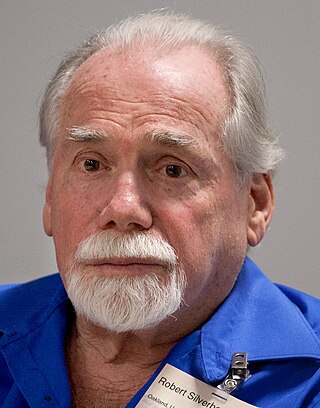
Robert Silverberg is a prolific American science fiction author and editor. He is a multiple winner of both Hugo and Nebula Awards, a member of the Science Fiction and Fantasy Hall of Fame, and a Grand Master of SF since 2004.
Pseudoarchaeology consists of attempts to study, interpret, or teach about the subject-matter of archaeology while rejecting, ignoring, or misunderstanding the accepted data-gathering and analytical methods of the discipline. These pseudoscientific interpretations involve the use of artifacts, sites or materials to construct scientifically insubstantial theories to strengthen the pseudoarchaeologists' claims. Methods include exaggeration of evidence, dramatic or romanticized conclusions, use of fallacious arguments, and fabrication of evidence.

Roma Eterna is a science fiction fixup novel by American writer Robert Silverberg, published in 2003, which presents an alternative history in which the Roman Empire survives to the present day. Each of the ten chapters was first published as a short story, six of them in Asimov's Science Fiction, between 1989 and 2003.
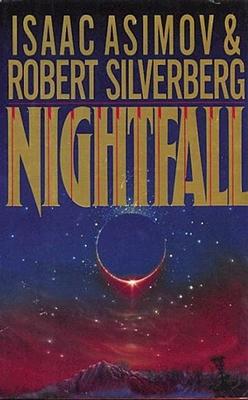
"Nightfall" is a 1941 science fiction short story by the American writer Isaac Asimov about the coming of darkness to the people of a planet ordinarily illuminated by sunlight at all times. It was adapted into a novel with Robert Silverberg in 1990. The short story has appeared in many anthologies and six collections of Asimov stories. In 1968, the Science Fiction Writers of America voted "Nightfall" the best science fiction short story written prior to the 1965 establishment of the Nebula Awards and included it in The Science Fiction Hall of Fame, Volume One, 1929–1964.

Many pre-Columbian cultures in North America were collectively termed "Mound Builders", but the term has no formal meaning. It does not refer to specific people or archaeological culture but refers to the characteristic mound earthworks that indigenous peoples erected for an extended period of more than 5,000 years. The "Mound Builder" cultures span the period of roughly 3500 BCE to the 16th century CE, including the Archaic period, Woodland period, and Mississippian period. Geographically, the cultures were present in the region of the Great Lakes, the Ohio River Valley, Florida, and the Mississippi River Valley and its tributary waters. Outlying mounds exist in South Carolina at Santee and in North Carolina at Town Creek.

The Man in the Maze is a science fiction novel by American writer Robert Silverberg, originally serialized in the magazine Worlds of If in April and May 1968, and published in bookstores the following year. It tells the tale of a man rendered incapable of interacting normally with other human beings by his uncontrollable psychic abilities. The novel is inspired by Sophocles' play Philoctetes, with the roles of Odysseus, Neoptolemus and Philoctetes played by Boardman, Rawlins, and Muller, respectively.
Martin Harry Greenberg was an American academic and anthologist in many genres, including mysteries and horror, but especially in speculative fiction. In all, he compiled 1,298 anthologies and commissioned over 8,200 original short stories. He founded Tekno Books, a packager of more than 2000 published books. He was also a co-founder of the Sci-Fi Channel. Greenberg was also an expert in terrorism and the Middle East. He was a longtime friend, colleague and business partner of Isaac Asimov.

Up the Line (1969) is a time travel novel by American science fiction author Robert Silverberg. The plot revolves mainly around the paradoxes brought about by time travel and is considered an example of the more sexually-permissive era of late 1960s American science-fiction, a reflection of the counterculture of its day. It was nominated for a Nebula Award for Best Novel in 1969 and a Hugo Award for Best Novel in 1970 but lost to Ursula K. Le Guin's The Left Hand of Darkness both times.

Dabel Brothers Productions is a U.S. publishing company of comic books and graphic novels. It was founded in 2001 and is based in Atlanta, Georgia. It is best known for its comic book and graphic novel adaptations of fantasy novels by major authors like Orson Scott Card, Raymond E. Feist, Laurell K. Hamilton, Robert Jordan, George R. R. Martin, R.A. Salvatore, Robert Silverberg, Tad Williams, Jim Butcher, Patricia Briggs, C.E. Murphy, Sherrilyn Kenyon, and Dean Koontz.
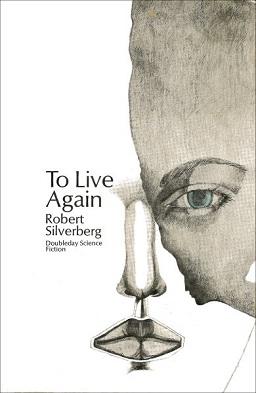
To Live Again is a 1969 science fiction novel by American writer Robert Silverberg.

Son of Man is a science fiction novel by American writer Robert Silverberg, published in 1971. The book is about Clay, a 20th-century man, who travels billions of years into the future and meets humanity in its future forms. Some of the issues discussed in the book are sexuality, telepathic communication between people, physical prowess or frailty, division of humans by caste or ability, and the preservation of ancient wisdom, among other things.

Thorns is a science fiction novel by American author Robert Silverberg, published as a paperback original in 1967, and a Nebula and Hugo Awards nominee.

Collision Course is a science fiction novel by American author Robert Silverberg, first published in hardcover in 1961 by Avalon Books and reprinted in paperback as an Ace Double later that year. Ace reissued it as a stand-alone volume in 1977 and 1982; a Tor paperback appeared in 1988. An Italian translation was also published in 1961, and a German translation later appeared. Silverberg planned the novel as a serial for Astounding Science Fiction, but John W. Campbell rejected the work and Silverberg eventually sold a shorter version to Amazing Stories, where it appeared in 1959.

Across a Billion Years is a 1969 science fiction novel by American writer Robert Silverberg.
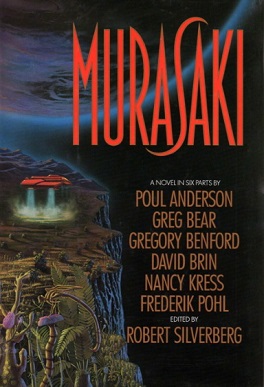
Murasaki is a 1992 "shared universe" hard science fiction novel in six parts to which Poul Anderson, Greg Bear, Gregory Benford, David Brin, Nancy Kress and Frederik Pohl each contributed one chapter; it was edited by Robert Silverberg. It is the first anthology of this type to be entirely conceived and written by winners of the Nebula Award.

The Nebula Awards #18 is an anthology of science fiction short works edited by American writer Robert Silverberg. It was first published in hardcover by Arbor House in October 1983; a paperback edition with cover art by Gary LoSasso was issued by Bantam Books in September 1984.

Here Comes Civilization is a collection of 27 science fiction stories written by William Tenn, the second of two volumes presenting Tenn's complete body of science fiction writings. It features an introduction by Robert Silverberg and an afterword by George Zebrowski. Tenn provides afterwords to each story, describing how they came to be written.
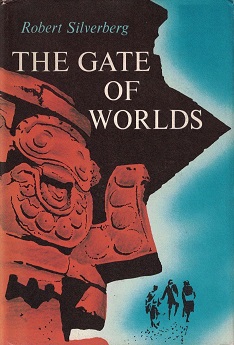
The Gate of Worlds is an alternate history novel by American writer Robert Silverberg. It was first published by Holt, Rinehart & Winston in the United States in 1967. The first UK hardcover edition was published by Gollancz in 1978.

List of the published work of Robert Silverberg, American science fiction author and editor. A complete list would include over 500 books.
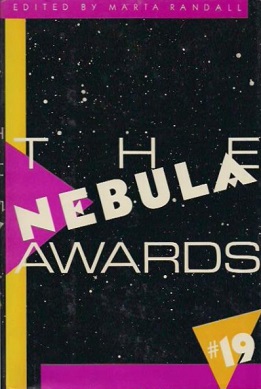
The Nebula Awards #19 is an anthology of award winning science fiction short works edited by Marta Randall. It was first published in hardcover by Arbor House in December 1984.



















